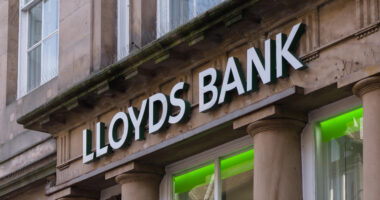
The global ESG fund industry is set to be worth as much as £42 trillion by 2025.
In light of this, figures showing four successive months of withdrawals in the UK from such funds – which prioritise environmental, social and governance criteria – may seem a blip.
But this is not so. It is a wake-up call that merits attention now, although it may not rival the sound and fury of the US culture wars over ‘woke’ investing.
Elon Musk considers ESG to be ‘the devil’. Florida governor Ron DeSantis is similarly unenthusiastic.
Even BlackRock boss Larry Fink, ESG’s most vocal proponent, now prefers to avoid the ESG term, considering it to have been ‘weaponised’.

Concerns: Figures show four successive months of withdrawals in the UK from ESG funds – which prioritise environmental, social and governance criteria
The British investors who cashed in close to £2billion worth of their ESG fund holdings since May have expressed their discontent through their withdrawals.
Some of this unhappiness focuses on the shares that are deemed suitable. The selection methodology is not consistent and can sometimes be bizarre.
In 2020, it emerged that some funds had stakes in Boohoo, apparently believing they could inspire a fast fashion business to become virtuous.
Defence companies are excluded, despite the role of businesses like BAE in the Ukraine war.
After all, what is more ethical than the defence of democracy? The anti-armaments stance has also adversely affected the funds’ returns.
Another concern is the funds’ lack of emphasis on the ‘G’ part of ESG, although superior governance standards should create better all round corporate citizens.
The cost of paying too little attention to governance is illustrated by the damage done to NatWest, which has lost Dame Alison Rose, its chief executive, over the disclosures about Nigel Farage’s bank account to a journalist.
Chairman Sir Howard Davies is set to follow suit. They seemed to forget that, in financial services, governance is based on trust. The FCA has delayed its proposed and much-needed ESG labelling rules until the end of year.
Until then, the withdrawals from ESG funds may continue because investors sense that they are being greenwashed.
Middle-class favourite
B&M is the secret haunt of the bargain-loving middle classes. They pop into one of its 707 stores, which are mostly based on retail parks with plenty of car parking space, following a visit to a nearby Lidl.
They leave B&M with something for their pet, and other items for the home.
This discounter excels at making you buy stuff. Its talents are now going to be put to the test following its acquisition of 51 of the 400 shops left empty by Wilko, the summer’s retail casualty.
Wilko stores are largely situated on high streets, which means that B&M must secure a new clientele – those get to shops on foot or on the bus.
This means that B&M’s merchandising division in the Far East – it orders directly from manufacturers – must produce ranges to tempt these shoppers.
B&M shares fell to 547.8p on the news of the Wilko store deal. Yet such is the belief of some analysts in B&M’s flair that they are targeting a price of 680p. B&M’s progress towards this level will be interesting.
But it will not be as compelling as the detailed account – that we are owed, I would argue – as to how Wilko failed to thrive amid a cost-of-living crisis, and role of the restructuring specialist Hilco, the main secured creditor to the retailer.
Will Wilko turn out to be the bargain of the year for Hilco? Almost certainly.
Arm wrestle
By now we should be less bitter about the news that Arm, the Cambridge-based semiconductor company, will float in New York rather than in London, and that US tech giants, like Apple and Nvidia, will be the ‘cornerstone’ investors. UK shareholders must wait their turn.
But the announcement that Arm shares will be valued at between $47 and $51 has served to remind us of the shortcomings of the UK stock market which was considered unworthy for various reasons, including the tepid welcome it tends to give to tech names.
The Americanisation of Arm will reignite the debate about the higher valuations that fund managers say would be afforded to some other British players by Wall Street.
What multiple, for example, would be given to Ashtead, the equipment supplier, since it makes 85 per cent of its sales and 90 per cent of its profits from its American Sunbelt operation?









